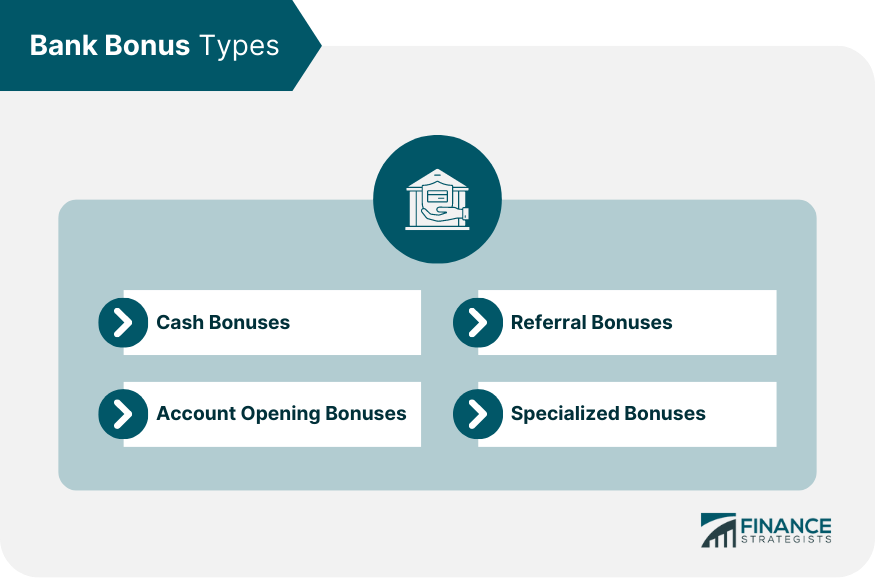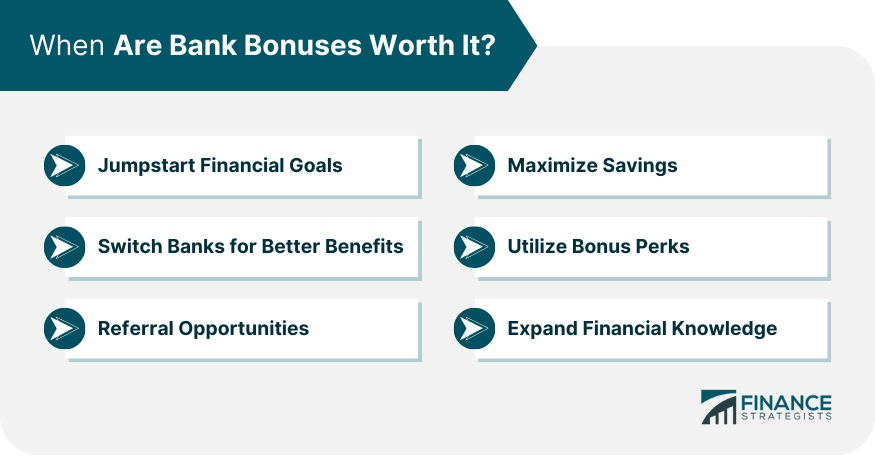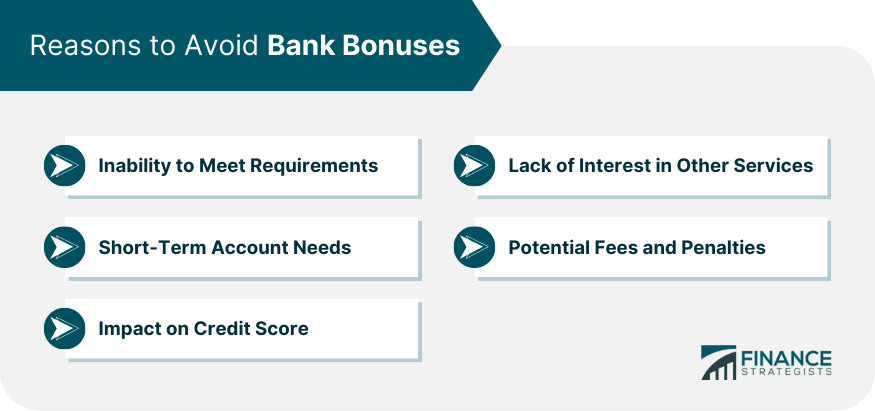Bank bonuses are special rewards offered by banks to attract new customers and retain existing ones. These rewards can come in the form of cash, gift cards, or better interest rates. Banks use these bonuses as a way to entice individuals to open new accounts or refer others to their bank, providing a win-win situation where customers receive extra financial benefits while banks expand their customer base. However, customers should be mindful of the specific terms and conditions attached to each bonus, ensuring they align with their financial goals and needs before pursuing them. These enticing offers promise extra money in your account and exclusive perks, but there are both pros and cons to consider. On the positive side, bank bonuses provide an immediate financial boost, giving you extra cash to save or invest. They also attract new customers with exciting rewards, making it appealing for those looking to switch banks. Some bonuses even offer exclusive benefits like priority customer support or better interest rates on savings accounts. However, there are also drawbacks to keep in mind. Many bonuses require maintaining a minimum account balance, which can be challenging for some customers and may result in fees or losing the bonus. Opening multiple accounts for bonuses can also temporarily lower your credit score due to multiple inquiries. Plus, unnecessary account openings can lead to more complexity in managing your finances and potential fees. Before diving into these enticing offers, consider your financial goals and whether the rewards align with your needs. Make an informed decision to ensure you truly benefit from bank bonuses. Common eligibility requirements include age restrictions, residency status, and sometimes even credit history. Certain bonuses may only be available to new customers, while others extend the offer to existing account holders as well. Moreover, some bonuses may be limited to specific account types or financial products offered by the bank. To qualify for a bank bonus, customers typically need to fulfill certain actions or conditions specified by the bank. This might involve depositing a minimum amount into the newly opened account, setting up direct deposits, or meeting specific transaction thresholds within a designated time frame. Bank bonuses come in a captivating array of types, each offering its unique allure to potential customers. Cash Bonuses: Provides customers with direct cash incentives deposited into their accounts after fulfilling specific requirements. These rewards can vary in amount, ranging from a fixed dollar figure to a percentage of the deposited funds. Account Opening Bonuses: Another type of bank bonus that welcomes newcomers to the bank's family. Customers may receive a financial reward or other perks for simply opening a new account and fulfilling the necessary criteria. Referral Bonuses: Leverages the power of word-of-mouth marketing. Existing account holders can earn rewards by referring friends, family members, or acquaintances to the bank and encouraging them to open accounts. The referring customer and the new customer both benefit from this type of bonus, creating a win-win scenario for all parties involved. Specialized Bonuses: This is tailored to specific financial products or services they offer. For example, customers may be rewarded for signing up for a credit card, taking out a personal loan, or enrolling in an investment account. These targeted bonuses serve as an incentive for customers to explore and utilize a broader range of the bank's offerings. Meeting the eligibility and qualification criteria is the first step, ensuring that customers fulfill all the necessary conditions to be eligible for the bonus. Some bonuses may only be available for a limited period, and customers must complete the required actions within this time frame to qualify for the reward. Missing these deadlines may result in the forfeiture of the bonus opportunity. Redeeming the bonus may require customers to follow specific procedures or meet additional conditions. For example, cash bonuses may be credited to the account automatically, while gift cards or other rewards may require customers to claim them through a designated process. Here are specific scenarios where it might be advantageous to explore these enticing incentives: Jumpstarting Financial Goals: If you have a clear savings goal, such as establishing an emergency fund, a well-suited bank bonus can provide an initial financial boost to help you get closer to your target. Switching Banks for Better Benefits: If you are dissatisfied with your current bank's offerings or are looking for additional perks, a bank bonus can be a compelling reason to make a switch. By exploring bonus offers from different banks, you may find institutions that better suit your financial needs, such as higher interest rates, fee waivers, or access to premium services. Referral Opportunities: Many bank bonuses include referral programs where you can earn rewards by referring friends or family to the bank. If you genuinely believe in the bank's services and are confident in recommending them to others, taking advantage of referral bonuses can be a win-win situation, benefiting both you and your referrals. Maximizing Your Savings: Pursuing multiple bank bonuses can lead to diversification of your accounts, allowing you to access various financial products and services. This diversification can maximize your savings potential, as different accounts may offer higher interest rates or unique benefits that complement your financial goals. Utilizing Bonus Perks: Some bank bonuses come with additional perks beyond the immediate cash reward. These perks may include fee waivers, discounts on banking services, or access to exclusive rewards programs. If these benefits align with your financial needs and preferences, the bonus can provide tangible value beyond the initial incentive. Expanding Your Financial Knowledge: Exploring different bank bonuses can introduce you to various financial products and features. As you navigate these offers, you may learn about new investment opportunities; savings accounts with attractive rates, or credit products with favorable terms. This knowledge can empower you to make more informed financial decisions. Avoiding a bank signup bonus can be a choice in certain situations, as these offers may not always align with your financial needs or may come with potential drawbacks. Here are specific instances when it might be best to steer clear of bank bonuses: Inability to Meet Requirements: Some bank bonuses come with strict eligibility criteria, such as maintaining a minimum account balance or setting up direct deposits. If you anticipate difficulty in meeting these requirements, pursuing the bonus could lead to unnecessary fees or a loss of the reward, making it wiser to avoid such offers. Short-Term Account Needs: If you have no intention of keeping the account open beyond the bonus qualification period, the effort and potential fees associated with the bonus might outweigh the benefits. In such cases, a simpler, no-frills account may be a more suitable choice. Impact on Credit Score: Opening multiple accounts within a short time can result in multiple hard inquiries on your credit report, potentially lowering your credit score temporarily. If you are planning to apply for a significant loan, like a mortgage, in the near future, it may be wise to avoid bank bonuses to protect your creditworthiness. Lack of Interest in Other Services: Some bank bonuses may be tied to opening specific accounts or using particular banking services. If you have no interest in these services beyond the bonus period, it might be more practical to avoid the offer and focus on accounts and products that align better with your needs. Potential Fees and Penalties: Some bank bonuses may have hidden fees or penalties associated with their terms and conditions. If the cost of maintaining the account or the risk of incurring penalties outweighs the value of the bonus, it may be best to forgo the offer. Bank bonuses can be enticing opportunities that offer immediate financial benefits and exclusive perks. However, it is crucial for customers to approach these offers with thoughtful consideration and thorough evaluation of their individual financial situations before deciding to pursue them. These bonuses are valuable for jumpstarting financial goals, switching to a better bank, and maximizing savings potential. Utilizing perks and expanding financial knowledge adds value, while strategic timing offers extra advantages. Avoid bank bonuses if you can't meet requirements or have short-term account needs. Impact on credit score, lack of interest in services, and potential fees are also crucial considerations. Ultimately, making well-informed decisions about pursuing or avoiding bank bonuses will empower you to make the most of these enticing incentives, ensuring that they truly benefit your unique financial situation and aspirations.What Are Bank Bonuses?
Are Bank Bonuses Worth It?
How Bank Bonuses Work
Eligibility and Qualification Criteria
Bonus Types

Conditions for Receiving and Redeeming Bonuses
When Are Bank Bonuses Worth It?

When to Avoid Bank Bonuses?

Conclusion
Are Bank Bonuses Worth It? FAQs
Yes, bank bonuses can be worth it as they offer immediate financial boosts, incentives for new customers, and access to exclusive services.
Bank bonuses provide extra money in your account, act as incentives for opening new accounts, and may offer exclusive perks like better interest rates.
Yes, some drawbacks include maintaining minimum balances, potential impact on credit scores, and complexity in managing multiple accounts.
Avoid bank bonuses if you can't meet the requirements, have short-term account needs, or are not interested in other bank services.
Consider your financial goals, the feasibility of meeting bonus requirements, and whether the rewards align with your needs before pursuing a bank bonus.
True Tamplin is a published author, public speaker, CEO of UpDigital, and founder of Finance Strategists.
True is a Certified Educator in Personal Finance (CEPF®), author of The Handy Financial Ratios Guide, a member of the Society for Advancing Business Editing and Writing, contributes to his financial education site, Finance Strategists, and has spoken to various financial communities such as the CFA Institute, as well as university students like his Alma mater, Biola University, where he received a bachelor of science in business and data analytics.
To learn more about True, visit his personal website or view his author profiles on Amazon, Nasdaq and Forbes.















